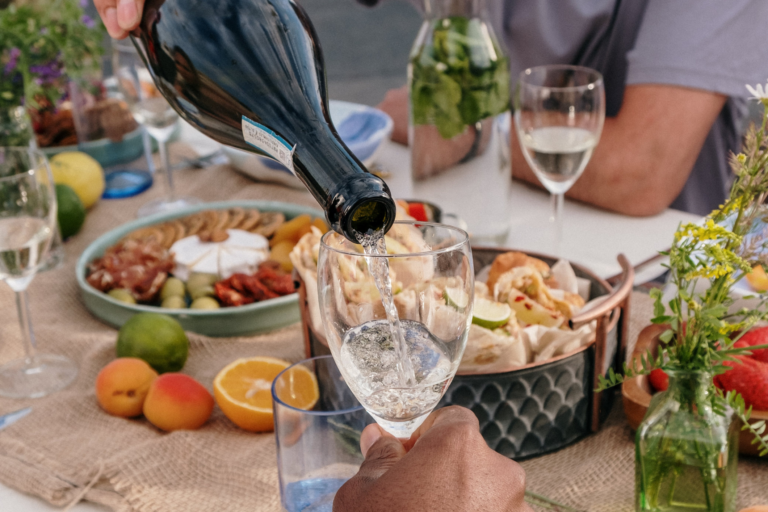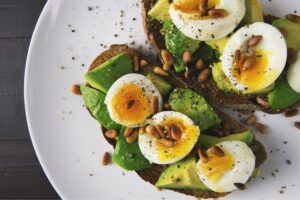BLOG:
Staying on Track in the Holidays: Healthy Eating and Socializing

Maintaining a vibrant social life is an essential part of happiness, yet it’s often mistaken for being the culprit behind derailing healthy eating habits. Margaritas, cheese boards and late-night snacks often become the enemies.
When your social calendar is full, it can be difficult to see how you can stay on track during the holidays, especially when working towards fitness goals such as body recomposition or body fat reduction. But don’t stress – with the right tools, you can strike a balance between a sparkling social life and healthy eating so that you can ensure you’re giving love to your body, and to your social life.
We are social creatures
Humans thrive on social connections, and a bustling social life isn’t just enjoyable; it’s also crucial for overall health, happiness and life-fulfillment.
Research suggests that people who frequently eat alone or have limited social interactions may be at a higher risk of nutritional deficiencies. Social dining often encourages a more varied and nutrient-rich diet.
Beyond the dietary aspect, socializing significantly influences emotional and mental well-being, elevating your quality of life.
Given that social gatherings often revolve around food, striking a balance is key. Let’s dive into some hot holiday tips to help you get the best of both worlds:
12 tips for navigating healthy eating in social environments:
1. Plan ahead for success
Begin your holiday season with a strategic plan. If a gathering leans towards indulgence, opt for nutrient-dense meals before or after to ensure your body receives the essential goodness it needs.
2. Zoom out for a wider view
Focus on the bigger picture. Consider your diet over the course of the week rather than fixating on a single meal or day. A couple of indulgent meals won’t derail your progress, in the same way that one workout won’t show instant results. Consistency is key.
3. Arrive satisfied, not starving
Don’t skip meals before a social event. Arriving ravenous leads to overconsumption and mindless eating. Stick to your regular eating patterns and focus on eating well balanced meals.
4. Make friends with protein
Protein is your ally during the holidays. It promotes a feeling of fullness, making it less likely for you to overeat. It also helps your body maintain muscle mass, which is essential for metabolic health. Prioritize protein-rich foods, such as lean meats, legumes, and nuts.
5. Sip smartly
Alcoholic beverages are often a part of celebrations, but the calories in cocktails and other alcoholic beverages can add up quickly. If you choose to drink alcohol, consider alternating between alcoholic and non-alcoholic drinks to pace yourself. Opt for lighter, less sugary drinks, and sip on a refreshing glass of water between drinks.
6. Treat yourself (in moderation)
The holidays wouldn’t be complete without a touch of indulgence. Instead of depriving yourself, savor your favorite treats in moderation – one a day is more than okay. Enjoy that slice of pie or piece of chocolate without guilt. This way, you’ll be less likely to lose control and overindulge when exposed to the things you’ve been craving and depriving yourself of.
7. Listen to your body
Listen to your body’s cues. Eat when you’re hungry and stop when you’re satisfied. Mindful eating helps you savor your meal and prevents mindless overeating.
8. Are you hungry? Or just dehydrated
Don’t forget to stay hydrated. Water not only keeps you feeling refreshed but can also help control your appetite. Before reaching for that second helping, have a glass of water to ensure you’re genuinely hungry and not just thirsty.
9. Mindful choices win
Opt for a balance; loading up on chips, sweets and chocolate might leave you feeling unsatisfied and craving more. Consider incorporating healthy food options at your social events when possible; such as fruit kebabs, vegetables, salads, lean proteins and whole grains.
10. Embrace non-food-centric socializing
Not every social gathering has to revolve around eating and drinking. Suggest alternative activities like beach walks, group hikes, a game night, painting classes, a dance class, or a festive craft session. Diversifying your social engagements can minimize the focus on food and create memorable experiences beyond the dinner table.
11. Manage your stress
The holidays can be stressful, and we all know stress can impact your eating habits. Incorporate stress-management techniques like deep breathing, meditation, nature walks, yoga or creative outlets to help keep stress levels in check. This will help to reduce the likelihood of emotional eating.
12. Banish guilt from the table
Really, guilt is doing you no favors. Enjoying a piece of cake or savoring your grandma’s delicious cookies during special occasions is part of the holiday experience. Guilt can often lead to a vicious cycle; guilt leads to stress, stress can lead to emotional eating, and emotional eating can lead to more guilt, and the cycle continues…
Instead of feeling guilty for enjoying the foods you love, see it as a form of self-care. Remember to enjoy the things you love in moderation and say goodbye and good riddance to guilt this holiday season.
Wrapping up: balancing health and happiness
Prioritizing social and emotional health is vital for a well-rounded life. Achieving your health and fitness goals while making the most of social events is entirely feasible when implementing some helpful tips. So, enjoy the party, bring back the joy in celebratory food, stay present and conscious of your choices, and drop the guilt.
Happy Holidays!





